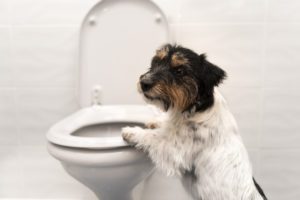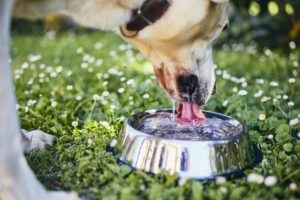Why is My Dog Having Diarrhea in Centennial, CO?
Why is My Dog Having Diarrhea in Centennial, CO?
We love to see our four legged friends happy and healthy. We love watching them run, chase, and play. We love their doggie kisses, friendly nudges, and furry cuddles. However, we hate seeing them lethargic and in pain. We really hate the messy and stinky reality of stomach issues. When your pooch is experiencing diarrhea, it’s not just gross, but puzzling.
Most dogs will have issues with diarrhea at some point. Keep in mind that diarrhea is not a disease itself, it is a symptom of something else going on in a dog’s body. Simply put, when the lining of the large intestine becomes inflamed, it is harder to reabsorb water, making the dog’s stool soft and watery.
Although it’s unpleasant, diarrhea is usually not serious and dog’s tend to make a quick recovery.
Read on for tips to help sooth your pup and what to look for that could be cause for concern.

What Causes Dog Diarrhea?
Mild bouts of diarrhea are common and are usually food related. A dog’s stomach is very sensitive and does not adjust well to sudden changes in diet. Knowing that your dog is not feeling their best can make any owner anxious. There usually is not a need for concern unless the diarrhea continues for more than 24 hours or is accompanied by weakness, fever, vomiting, abdominal pain, drooling, or loss of appetite. Most cases of simple diarrhea will resolve, but dogs with chronic diarrhea may require diet changes or medication.
Common Causes of Dog Diarrhea Include:
- Food issues– Maybe your pup found his way into the garbage or picked up an unappealing object on a walk? Some pet foods are full of additives, flavorings, and preservatives and can cause a reaction, particularity if you are trying a new flavor or brand.
- Foreign Objects – Items that were never meant to make it into your dog’s mouth and stomach can be rough on the lining of the intestines. Things that have no business being in your dog’s tummy such as toys, bones, fabric, leaves, or other foreign objects can cause diarrhea, or even blockages that require surgery to remove. Poisons, cleaning supplies, and other toxins are another scary cause of diarrhea.
- Medications– Any new medication, especially antibiotics can trigger a reaction.
- Stress or anxiety– Separation anxiety, a change in environment, travel, and kennel boarding can cause anxiety resulting in an upset tummy.
- Parasites– Many parasites can cause diarrhea. Examples include giardia, coccidia, and whip worms. Most vets will recommend a fecal exam to check for parasites as part of an annual checkup.
- Viral infections – Distemper, coronavirus or parvovirus can be passed from dog to dog. These are especially worrisome in puppies that have not completed their vaccinations.
- Bacterial infections– Dog’s can pick up a plethora of bacterial infections including staph infections which will likely need to be treated with an antibiotic.
- Other Diseases- Diarrhea is an unfortunate side effect of many other illnesses including intestinal cancer, colitis, pancreatitis, inflammatory bowel disease, and liver or kidney disease.
What Color is Your Dog’s Poop?
Brown Stool– Firm brown dog poop is ideal. If your dog’s poop is chocolate in color and firm enough to pick up easily, this is a good sign.
Brown Stool with white specks– White specks are probably intestinal parsites. If you notice any movement movement in the stool, call the vet.
Green Stool- Have you noticed your pup chewing grass? This might be an indication of an upset stomach. If your dog is experiencing GI issues, he may eat grass to make himself vomit. If you notice patches of green in the waste, it is okay. However, if your dog’s poop is actually a shade of green, this can point to GI upset, parasites, or infections.
Black Stool- Black or very dark brown stools can indicate old blood. It can be caused by GI ulcerations, kidney problems, parasites, or bleeding in the stomach.
Yellow Stool- Yellow or orange stool can be a sign of liver disease or bacteria overgrowth.
Blue Stool- Treat blue diarrhea as an emergency! Rat poison is typically blue and it could be extremely dangerous if digested.
Grey Stool– Fresh gray stool can indicate issues of the pancreas, gallbladder, or parasites.
Bloody Stool- Dogs can have bloody poop with GI upset. It may not be unusual to see streaks of red in your dog’s stool and small occurrences are okay, but frequent bloody stools may indicate parvovirus, infections, or colitis.
Stool with Mucus– A small amount of mucus in stool is normal, it is in the intestines naturally and helps lubricate the passing of waste. When the intestinal tract is inflamed, you may notice larger trails of mucus that are not normal.

How to Stop Dog Diarrhea
If you have ruled out an emergency and are ready to get some nutrition back into your dog, remember to start slow. Withhold all food for 8-12 hours to let the intestines rest. Remember that you are withholding food- not water.
When you are ready to start feeding again, start with a small amount. For small breeds, start with a tablespoon of food, for large breeds, try a golf ball-sized portion. Try making some fresh, easily digestible, bland foods before re-introducing your dog’s usual food.
Dog Foods that Help Stop Diarrhea Include:
Shredded chicken– Plain, unseasoned, boiled, shredded chicken is easy to digest and is packed with protein, vitamins and minerals.
White Rice- Rice is the chosen grain for an upset stomach because it is easy to make, quick to digest, and very bland. Boil the rice in water and do not add any seasonings or spices. Do not use brown rice because it is unprocessed and too hard to digest.
Pumpkin- Pumpkin and sweet potato have similar digestive benefits. They are high in fiber for regulation and can help minimize the growth of “bad” bacteria that leads to irritated intestines and diarrhea. Cooked, peeled, unsalted, and unseasoned pumpkin/sweet potatoes are chock full of vitamins and minerals.
Bone broth– This is the liquid made from boiling animal bones and connective tissue in water. It’s rich in collagen, amino acids and other beneficial minerals. Bone broth makes an excellent liquid meal for upset stomachs. It is also an easy way to add moisture and flavor to dry food.
Baby Food– Baby food is very easy to swallow and digest. Veterinarians recommend feeding Stage II meat-based baby foods like chicken, lamb, and turkey. Make sure the baby food does not contain any garlic or onion powder.
Other Great Choices- Other foods that might help to soothe your dog’s upset tummy include natural yogurt, peeled boiled potatoes, cottage cheese, egg, white fish, ground turkey or beef, rice water, bananas, and applesauce. Make sure all food choices are bland and drained of any grease.
In certain circumstances, you may consider over-the-counter diarrhea medication, probiotics, or Pepto-Bismal. Never give your dog medications formulated for people before talking to your vet. Human medications can be toxic to dogs so always double check.
As you begin to notice your dog’s stool returning to normal, you will probably be ready to reintroduce regular dog food. Try mixing the bland food you have been using with small amounts of regular dog food for a few days. Decrease the special diet items until your pup is completely back on their regular diet. If you notice any changes in stool again, slow down and revert to the diet that was working.
Keep Drinking Water
It cannot be stressed enough that even if your dog is not eating, they must keep drinking! If your pup has lost its appetite or has continued diarrhea, there is always the risk of dehydration. Your dog needs to drink enough fluids to replace what the body loses through watery stools. You can do a quick at home test to see if your pup is dehydrated.
Pinch the skin gently at the back of the neck and then let go. It should bounce right back again. If the pinch of skin takes a second or more to go back, your dog might be dehydrated. Other signs of dehydration include loss of appetite, dry nose, panting, and sunken eyes. Dehydration can be hard on your dog’s kidneys and heart. Make water readily available or try feeding your dog ice chips. You can also save some of the water after making rice or broth for a tastier option.

Conclusion
You have learned that canine diarrhea is not just unappealing, it can be a sign that something is off with your pooch. If you can monitor your dog’s waste and take these steps, it shouldn’t be long before your dog returns to their normal frisky self. You know your dog and you know when they aren’t 100%. Keep your eyes peeled for signs of distress and call our veterinarian at (303) 850-9393 or Make an Appointment.
